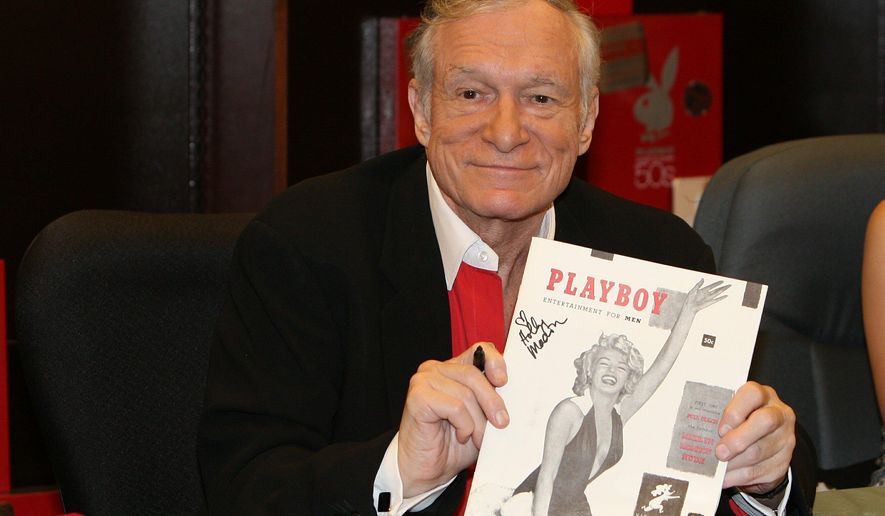Playboy’s recent announcement that its magazine will no longer depict fully naked women in its pages is a significant cultural shift — showing that people now crave extreme or “fetishized” images and acts, says an anti-exploitation organization.
Playboy “paved the way” for soft-core pornography to enter the mainstream culture and create what is now “a pandemic of pornography,” Haley Halverson, director of communications at the National Center on Sexual Exploitation, said Wednesday.
Now Playboy has found that “mere nudity … isn’t even profitable anymore,” she said.
“What we’re really seeing is not a turn away from nude pictures in magazines, but really a turn towards hard-core, online pornography,” said Ms. Halverson. This is because pornography viewers can become desensitized by images, and seek unusual or extreme images, including ones that are “fetishized” or involve violence, she said.
Playboy’s less-nude policy change, first reported in an Oct. 12 story in The New York Times, was recently presented to Hugh Hefner, who created and printed the first magazine in 1953 with Marilyn Monroe on its cover and fully nude inside its pages.
Mr. Hefner, 89, agreed that Playboy would stop publishing fully nude photos of women as of the March 2016 issue.
People are now “one click away from every sex act imaginable for free,” Scott Flanders, chief executive of Playboy Enterprises, told The New York Times. “And so it’s just passe at this juncture,” he said of the magazine’s nude pictures.
The Guardian in London noted that media mogul Rupert Murdoch ended the Sun’s racy “Page 3 girls” in January largely for the same reasons: Nudity on a page, either newsprint or glossy, is outdated.
“In these digital days, where anything goes, ’tame’ airbrushed photographs of naked women look hopelessly old-fashioned,” the Guardian wrote.
Playboy stopped posting full nudity on its website in 2014. Its revamped magazine will still feature Playmate of the Month, but carry enticing images of women that are “PG-13,” as well as interviews and other content aimed at young men who live in cities, the New York Times said.
According to Adult Video News (AVN), not everyone endorsed Playboy’s course change.
“I think the move by Playboy is brand suicide,” said Kelly Holland, managing director of Penthouse, which followed Playboy into the publishing market in the 1960s.
“To say that now, nudity is ’passe’ is unbelievable. Nudity has not been passe for 200,000 years, and it won’t be passe in another 200,000 years,” Ms. Holland told AVN.
Larry Flynt, the 72-year-old owner of the Hustler empire, also said Playboy’s decision made no sense.
“I think they’re losing money and it’s a sign of desperation,” Mr. Flynt told CNN, according to AVN.
“There were a lot of advertisers that Playboy could never get because they had nudity. They take the nudity out, and they think they’re going to get more advertisers. But you take the nudity out, you lose the demographic and you can’t get advertisers. So it’s a bad business decision,” Mr. Flynt said.
Separately on Wednesday, the center on sexual exploitation, or NCOSE, announced that it has received assurances from Hyatt Hotel Corp. that it will remove on-demand pornography from its guest rooms worldwide.
Patrick Trueman, president and chief executive of NCOSE, said Hyatt responded to its concerns about pornography’s harmful impact on people’s neurological and psychological well-being, as well as its involvement in prostitution and sex trafficking. He praised Hyatt for its decision to be a leader among corporations “that value a positive and safe environment for their consumers.”
In August, Hilton Worldwide said it would also be ending all adult video-on-demand entertainment in its properties, as it was “not in keeping with our company’s vision and goals moving forward.”
NCOSE praised Hilton’s move — and removed the company from its “Dirty Dozen” list — and urged more hotel chains to join Hilton, Marriott, Omni, Drury, Ritz-Carlton and Nordic Choice Hotels in such a policy.
• Cheryl Wetzstein can be reached at cwetzstein@washingtontimes.com.




Please read our comment policy before commenting.